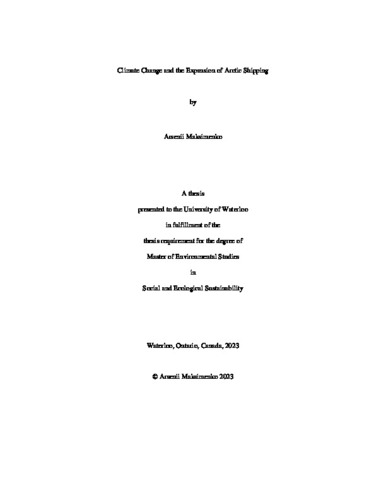UWSpace will be migrating to a new version of its software from July 29th to August 1st. UWSpace will be offline for all UW community members during this time.
Climate Change and the Expansion of Arctic Shipping
| dc.contributor.author | Maksimenko, Arsenii | |
| dc.date.accessioned | 2023-06-29 12:55:46 (GMT) | |
| dc.date.available | 2023-06-29 12:55:46 (GMT) | |
| dc.date.issued | 2023-06-29 | |
| dc.date.submitted | 2023-06-24 | |
| dc.identifier.uri | http://hdl.handle.net/10012/19593 | |
| dc.description.abstract | The potential economic benefits from increased Arctic shipping are enormous. As well as changing the logistics of global trade, Arctic shipping routes have the potential to generate inward investment flows benefiting the Northern and Indigenous communities, supporting regional development, and enhancing economic and social sustainability. At the same time, however, unregulated economic expansion carries a significant risk. In such a fragile region the ecological consequences might be severe and potentially irreversible. Likewise, the social, economic, and cultural consequences of such ecological damage would likely cause serious disruptions, affecting life across the region, as well as having global impacts in terms of climate change. For this reason, during this early, preparatory period, well before any large-scale commercial exploitation, it is imperative that the community of nations and other stakeholders establish a clear and effective set of standards along with an effective governance regime to regulate Arctic shipping to ensure contributions to long-lasting wellbeing. In the case of the largely pristine Arctic environment, it is crucially important that we understand the ecological and biophysical limits of increased exploitation to avoid irreversible impacts whereby disruption and crisis will outweigh stability and development. This research seeks to understand the potential expansion of commercial Arctic shipping in the wake of the anticipated decline of Arctic sea ice. In the first phase of a longer-term doctoral project, my goal has been a preliminary review and synthesis of the literature relating to medium- and long-term costs and benefits with respect to sustainable development in the region. This scoping project has been designed as the first step toward the development of a Sustainable Arctic Shipping Standard (SASS). The research centers on the analysis of literature from a diverse range of scientific fields to create a comprehensive picture of the potential threats arising from increased Arctic sea shipping. This research shows that anticipating the overall impact of arctic shipping on regional sustainability is extremely complex. While the environmental impact might be more negative, there are some serious economic advantages, that are often opposed to the environmental losses. The effects on local communities are also ambiguous and further research is needed to have a more defined conclusion. Nevertheless, the key areas of concern and opportunity are usefully identified. | en |
| dc.language.iso | en | en |
| dc.publisher | University of Waterloo | en |
| dc.subject | sustainability | en |
| dc.subject | arctic shipping | en |
| dc.subject | climate change | en |
| dc.subject | logistics and supply chains | en |
| dc.subject | sustainable economic development | en |
| dc.subject | corporate sustainability | en |
| dc.title | Climate Change and the Expansion of Arctic Shipping | en |
| dc.type | Master Thesis | en |
| dc.pending | false | |
| uws-etd.degree.department | School of Environment, Resources and Sustainability | en |
| uws-etd.degree.discipline | Accounting | en |
| uws-etd.degree.grantor | University of Waterloo | en |
| uws-etd.degree | Master of Environmental Studies | en |
| uws-etd.embargo.terms | 0 | en |
| uws.contributor.advisor | Quilley, Stephen | |
| uws.contributor.affiliation1 | Faculty of Environment | en |
| uws.published.city | Waterloo | en |
| uws.published.country | Canada | en |
| uws.published.province | Ontario | en |
| uws.typeOfResource | Text | en |
| uws.peerReviewStatus | Unreviewed | en |
| uws.scholarLevel | Graduate | en |

